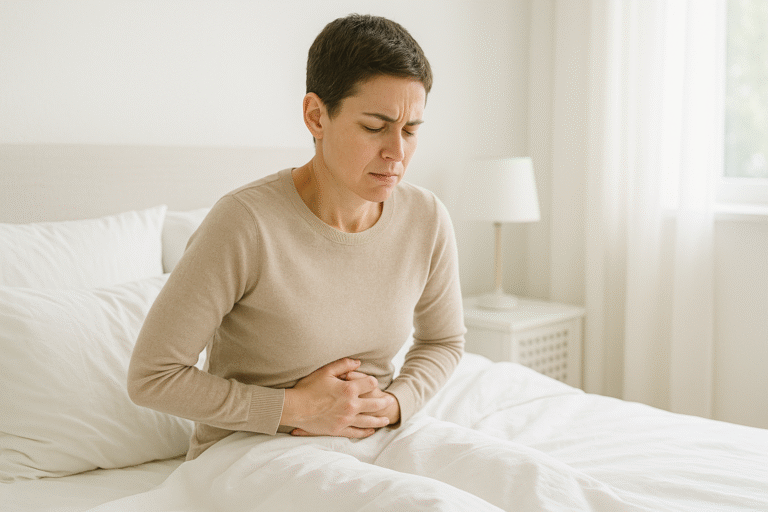Being diagnosed with Crohn’s disease can feel like life just tossed you a curveball. The frustration of learning new medical jargon, googling every symptom, and grappling with the ups and downs of flare-ups can be exhausting. But here’s the reality: millions are living full, rewarding lives with Crohn’s disease—and so can you. This guide is packed with straight-talking advice to help you move from uncertainty to confidence, one step at a time.
My Experience Living with Crohn’s
Alright, let’s get real. Living with Crohn’s disease can be a right royal pain. For those of you who haven’t been diagnosed yet, you might be feeling a whirlwind of emotions – fear, confusion, maybe even a touch of “is this a bad vindaloo or something more?”. And to those incredible souls supporting someone with Crohn’s, well, you deserve a medal. It’s not always easy, but let me tell you, life with Crohn’s can be pretty darn good.
I was diagnosed with Crohn’s in my early twenties, and it felt like my world had shrunk to the size of a public toilet (not exactly the most scenic view). But over the years, I’ve learned a thing or two about navigating this condition. So, settle in, and let’s chat about living well with Crohn’s disease.
Getting Started After a Crohn’s Diagnosis
The initial diagnosis can be overwhelming. There are a million questions, a barrage of medical terms, and probably a healthy dose of “what the heck now?”. Here’s the thing: you’re not alone. There’s a whole community out there, from doctors and specialists to fellow Crohn’s warriors, ready to support you.
- Understanding the Diagnosis Crohn’s is an inflammatory bowel disease (IBD) that causes inflammation in your digestive tract. It can be a real rollercoaster ride, with periods of remission (when things are relatively calm) and flare-ups (when symptoms like cramps, diarrhoea, and fatigue flare up). The Crohn’s & Colitis Foundation is a fantastic resource for in-depth information about the disease.
- Coming to Terms with Crohn’s It’s okay to feel angry, scared, or frustrated. Talking to a therapist or counsellor can be a great way to process your emotions and develop healthy coping mechanisms. Remember, knowledge is power. The more you understand about Crohn’s, the better equipped you’ll be to manage it.
What Life with Crohn’s Looks Like
Now, let’s look into the nitty-gritty of living with Crohn’s. Here are some common questions that might be swirling around your mind:
Can Life Be “Normal” with Crohn’s?
Crohn’s can throw in a few obstacles, but it doesn’t get to control your path. With the right treatment and smart adjustments, you can lead a life that feels rewarding and genuinely yours. Think of Crohn’s as a side character in your story, not the lead role.
How Does Crohn’s Affect Everyday Life?
Crohn’s can impact various aspects of your life, from work to socialising. It’s crucial to be open and honest with your employer about your condition. They’re legally obligated to make reasonable adjustments to accommodate your needs.
When it comes to socialising, remember, true friends will understand if you need to cancel plans due to a flare-up. There will also be days when you feel fantastic – those are the days to grab your mates and make the most of them!
Does Crohn’s Get Worse with Age?
Crohn’s can evolve over time, but advances in treatment are keeping pace. While symptoms might shift or intensify, there’s no shortage of tools to help you manage them effectively.
Is Crohn’s a Disability?
Crohn’s can be considered a disability under the Equality Act 2010. This means you may be entitled to certain protections against discrimination.
What to Expect When Living with Crohn’s
Do People with Crohn’s Get Sick a Lot?
During flare-ups, you might be more susceptible to infections. However, with proper treatment, a healthy lifestyle, and a balanced gut microbiome, you can minimise the risk of getting sick frequently.
Do You Sleep a Lot with Crohn’t Disease?
Fatigue is a common symptom of Crohn’s, and it can definitely disrupt your sleep patterns. There are ways to manage fatigue, though, such as establishing a regular sleep schedule, creating a relaxing bedtime routine, and exercising regularly (but not too close to bedtime).
What Does Crohn’s Fatigue Feel Like?
Crohn’s fatigue is different from normal tiredness. It’s a deep, bone-aching exhaustion that can leave you feeling wiped out, even after a good night’s sleep.
What is the Life Expectancy of Someone with Crohn’s Disease?
The good news is that Crohn’s itself doesn’t typically shorten your life expectancy. With proper treatment and management, people with Crohn’s can live long and healthy lives.
How Severe Can Crohn’s Get?
It’s important to remember that Crohn’s affects everyone differently. Some people experience mild symptoms, while others have more severe flare-ups. Here are some questions you might have about disease severity:
What’s the Worst That Can Happen with Crohn’s Disease?
In severe cases, complications like bowel obstructions or fistulas (tunnels that form between the intestine and other organs) can develop. If you experience persistent symptoms or severe pain, it’s crucial to seek medical attention immediately.
Does Crohn’s Prevent You from Doing Things?
Crohn’s doesn’t have to hold you back from living your life. While you might need to adjust your activities during flare-ups, there are ways to manage your condition and stay active. Learning about your limitations and planning ahead can help ensure you can still participate in the things you enjoy.
When to Go to A&E with Crohn’s?
If you experience severe abdominal pain, uncontrollable bleeding, or vomiting that won’t stop, it’s important to go to the Accident & Emergency department (A&E) right away. Early diagnosis and treatment can help prevent complications.
Can Crohn’s Disease Be Cancerous?
While Crohn’s itself isn’t cancer, people with long-standing inflammation have a slightly increased risk of developing colon cancer. Regular screenings are important for early detection and treatment.
Managing Symptoms and Staying Healthy
Living with Crohn’s is about understanding your condition and finding straightforward ways to keep it in check. Here’s how to tackle symptoms while building a healthier, more sustainable lifestyle.
Alcohol can irritate your digestive system and potentially worsen symptoms, especially during flare-ups. It’s best to talk to your doctor about alcohol consumption and how much, if any, is safe for you.
There’s no clear scientific evidence that chocolate directly triggers Crohn’s symptoms. However, some people find it does bother their gut. The key is to identify your own food triggers and keep a food diary to track how different foods affect you.
Eggs are generally a good source of protein and can be a safe option for most people with Crohn’s. As always, though, if you experience any discomfort after eating eggs, discuss it with your doctor.
Staying hydrated is crucial for managing Crohn’s. Water is always the best choice, but herbal teas (like peppermint or ginger) can also be soothing for your digestive system. Fizzy drinks and sugary beverages should be limited, as they can worsen diarrhoea.
Weight loss in Crohn’s can occur due to several factors, including decreased appetite, nutrient malabsorption, and inflammation. If you’re struggling to maintain a healthy weight, talk to your doctor or a registered dietitian about creating a personalised meal plan.
Crohn’s doesn’t always announce itself loudly. Subtle signs—like persistent fatigue, mouth ulcers, or recurring heartburn—can often fly under the radar. Spot these early and speak with your doctor for a clearer diagnosis.
Increased frequency of your usual symptoms, changes in bowel habits, or new symptoms like fever or night sweats can indicate a worsening of your Crohn’s. Don’t hesitate to reach out to your doctor if you suspect a flare-up is coming on. Early intervention can help prevent the flare-up from becoming severe.
Living with untreated Crohn’s is not recommended. Untreated Crohn’s can lead to serious complications, including malnutrition, bowel obstructions, and even surgery. Early diagnosis and treatment are key to preventing these complications and living a healthy life.
Absolutely! Many people with mild Crohn’s disease are able to manage their symptoms effectively with medication and lifestyle modifications. The key is working with your doctor to develop a treatment plan that fits your individual needs.
Yes, Crohn’s can worsen over time if left untreated. This is why regular check-ups with your doctor and adherence to your treatment plan are so important. Early intervention can help prevent complications and maintain a good quality of life.
Crohn’s is a chronic illness, but it can go into remission, meaning symptoms disappear or become very mild. While there’s no cure for Crohn’s, certain lifestyle changes, like stress management and a healthy diet, can help promote remission and reduce the frequency of flare-ups.
The course of Crohn’s is unpredictable. While some people experience mild symptoms throughout their lives, others may have periods of worsening and improvement. Working with your doctor to manage your condition and maintain a healthy lifestyle can help you experience longer periods of remission.
Staying Balanced with Crohn’s
Crohn’s may be a part of your life, but it doesn’t have to define it. Here are some key aspects to consider for a well-rounded and fulfilling life:
Diet and Nutrition
Maintaining a healthy diet is crucial for managing Crohn’s. There’s no one-size-fits-all approach, but some general tips include:
- Identifying food triggers: Keep a food diary to track how different foods affect you.
- Staying hydrated: Drink plenty of water throughout the day.
- Eating smaller, more frequent meals: This can be easier on your digestive system than large meals.
- Considering a low-fibre diet: During flare-ups, low-fibre foods can help reduce symptoms like diarrhoea. Ask your doctor or a registered dietitian for guidance.
- Taking Supplements: Vitamin and mineral deficiencies are common in Crohn’s. Discuss with your doctor if supplementation is right for you.

Exercise and Movement
Regular exercise can improve your overall well-being and even help manage Crohn’s symptoms. Here are some pointers:
- Finding activities you enjoy: Walking, swimming, yoga, or gentle cycling are all excellent options.
- Listening to your body: Don’t push yourself too hard, especially during flare-ups.
- Starting slow and gradually increasing intensity: This will help you avoid injury.

Stress Management
Stress can worsen Crohn’s symptoms. Here are some relaxation techniques you can incorporate into your daily routine:
- Deep breathing exercises: Take slow, deep breaths to calm your mind and body.
- Meditation: Mindfulness meditation can help reduce stress and improve overall well-being.
- Yoga or Tai Chi: These gentle exercises combine physical movement with mindfulness practices.
- Spending time in nature: Take a walk in the park or simply sit outside and enjoy the fresh air.
Mental and Emotional Wellbeing
Living with a chronic illness can take a toll on your mental health. Don’t hesitate to seek support if you’re feeling overwhelmed, anxious, or depressed. Here are some resources:
- Talk therapy: Talking to a therapist can help you develop coping mechanisms for dealing with Crohn’s and its emotional impact.
- Support groups: Connecting with others who understand what you’re going through can be incredibly helpful.

Building a Strong Support System
Surrounding yourself with positive and supportive people is essential. Talk to your family and friends about your condition, and don’t be afraid to ask for help when you need it.
Remember, you’re not alone! There’s a whole community of people living with Crohn’s disease. Reach out to online forums, support groups, or even a Crohn’s charity for additional resources and connections.
Conclusion
Living with Crohn’s can be challenging, but it’s absolutely possible to live a happy and fulfilling life. By taking charge of your health, making healthy lifestyle choices, and building a strong support system, you can manage your Crohn’s and thrive. This blog is just a starting point – remember, you’re the expert on your own body. Work with your doctor to create a personalised plan that works best for you. With the right approach, you can turn Crohn’s from a burden into a blip on the radar of your amazing life.





